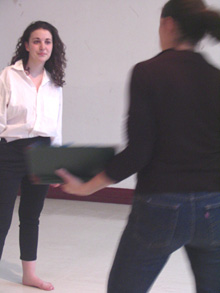Prolonged research enriches latest theatre production

Kate Bligh in rehearsal with student actors
Students in the Theatre Department have been working on their latest production for 10 months, an unusually long time. It is part of director Kate Bligh’s intention to show the students how academic research can be the starting point for creating a role.
Our Country’s Good, by Timberlake Wertenbaker, is based on a novel by Thomas Kenneally, and on Australian and British history.
The story is about a shipload of British convicts transported to the wild shore of Australia in 1789. The ambitious young officer in charge of the penal colony decides to produce a play. The process teaches everyone, enforced actors and their jailers, some lessons for life.
The 11 student actors were cast in May, and given a summer reading list to familiarize them with the context of the play. The design students working on the production were also given research to do.
In the fall, the cast, plus three students working as dramaturges, took a class with Bligh to explore the geography, politics, philosophy, society and history of the play, and the acting techniques, physical characteristics and accents that would be used in performance.
Most of the characters in the play are convicts who were transported to Australia for small crimes, and Bligh wanted them to understand what it would be like to experience whipping, sexual degradation and hunger for, say, stealing a handkerchief.
Bligh said the long rehearsal time represents a new production model that more closely resembles the francophone model of a detailed, structured and lengthier preparation and rehearsal process.
“In Germany, Russia and Scandinavia, it's still not unusual for a play to be rehearsed for one or two years prior to public presentation. I once saw a production of Macbeth by the Schiller Company from Germany that took my breath away. It had been in rehearsal for three years.”
Francophone actors are paid for performances rather than for rehearsals, so the rehearsal periods in Quebec tend to be stretched out over months to enable the actors to earn money elsewhere at the same time.
“This allows for a lot more contemplation and individual development on the part of the actors. Some of the more fortunate companies, like Robert Lepage's Deus Ex Machina or Carbone 14, are able to pay their actors to be in rehearsal for months.”
The English model of three or four weeks of rehearsals is inherited from the repertory system, where the actors would be on a seasonal salary, and be expected to know and perform many plays at the same time.
“This speed of preparation and turnover is feasible for fully trained, experienced professional artists who are familiar with the requirements of specific genres of performance,” Bligh said. “But when the same model is applied to students or young actors, the resulting performances show them dealing mostly with stress and stamina and panic and allows precious little artistry to show through or be learned.”
Bligh, who started her career in England, said she has worked with francophones in Montreal. “I was fortunate enough to witness the benefits of the extended process, and this is the case for some of my colleagues in the Theatre Department also.
“There is a sense in the department at the moment that it can improve the pedagogic and academic quality of the very resource-intensive productions we undertake. The Our Country's Good project is just one of a number of rehearsal models which are being employed.”
Bligh added that the students have responded well, and their attendance and punctuality has been “just about perfect.”
Our Country’s Good, by Timberlake Wertenbaker, directed by Kate Bligh, runs until April 10 at the D.B. Clarke Theatre. For more information, see the Back Page.